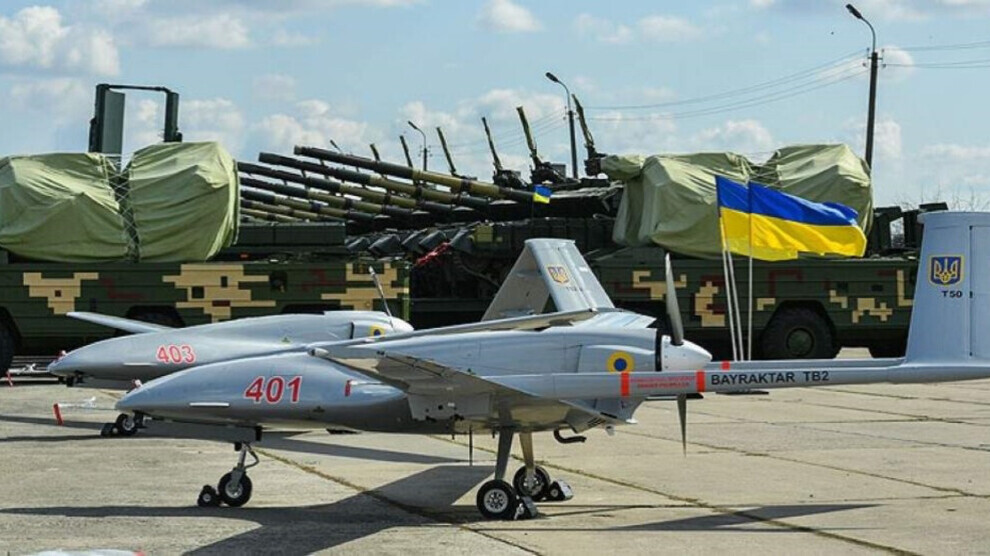Russia's military operation against Ukraine concerns Turkey as well. Why is it so?

ANF
NEWS DESK
Friday, 25 Feb 2022, 13:27
The military operation launched by Russia on February 24 is a particular concern to the Turkish state, both historically and currently. This war will affect Turkey in terms of arms sales, tourism revenues and energy supply. Turkey's arms agreement with Ukraine has already been affected.
The Russian army announced that they had destroyed 74 military facilities, 11 of which were aerial domains, on the first day of the war. Defence Ministry spokesman General Igor Konashenkov also announced that the Russian forces destroyed three command centres, a naval base, 18 S-300 and Buk-M1 air defence radar systems, an attack helicopter and 4 Bayraktar TB-2 Turkish-made lethal drones.
Military forces of Luhansk People’s Republic, backed by Russia, also announced that they shot down two Ukrainian planes and two Bayraktar TB2s.
Ukrainian companies were supplying different sophisticated drone engines to Turkey. Bayraktar TB-2 drones have been produced in Kiev since the end of 2021. Moreover, the Baykar company, which produces TB-2, purchased land and started to build a factory in Ukraine in December. Last year, Ukrainian officials announced that they had bought 12 TB-2s and were planning to purchase 24 more.
The Moscow administration has repeatedly expressed its discomfort with the Turkish drone sale to Ukraine. Turkish drones were used especially against the rebel forces in the Donbass region, who declared a republic unilaterally.
Turkish drones, which are used effectively against forces that do not have air defence systems and aircraft, have become one of the main instruments of war crimes committed in many parts of the world, particularly in Rojava. There are international reports of war crimes committed by Turkish drones in Ethiopia and Libya. These killer robots are used for extrajudicial executions with complete impunity.
Turkey sells drones to African countries such as Morocco, Algeria, Rwanda, Nigeria and Ethiopia.
However, these drones have proved to be ineffective against a much more advanced military power such as Russia. The Ukrainian war has shown that Turkish drones have remained impotent against Russian military power.
While the war in Ukraine played havoc with the military cooperation of the Turkish state, it also triggered long-term fears of the Turkish state.
HISTORICAL AND CURRENT FEARS
The Ottomans reigned in the Crimea for a long time. Located in current Ukraine and annexed to Russia in 2014, Crimea was one of the first Ottoman strongholds to be captured by the Russians in 1783. In the century following the fall of the Crimea, the Russian empire seized western parts of Ukraine and, in 1878, Russian forces came very close to Istanbul. The Ottomans lost their Balkan provinces under the pressure of Moscow and new states were established. In the east, following a bloody war and massacres in the Caucasus, the Russian empire advanced towards Artvin and other cities in North Kurdistan such as Kars and Ardahan.
Ukraine has long been considered as a buffer zone to prevent Russian influence in the region. Ukraine’s fall is likely to lead to serious consequences for the Turkish state. However, it remains unclear how Turkey will pay for the consequences. Just like NATO, Ankara seems worried. It is argued that Ankara will avoid confrontation with Russia regardless of its economic interests, because the Turkish economy is expected to be affected much more heavily by the recent war.
The Turkish state benefited from the Ukrainian gas crisis in 2014. In order to continue the gas sales to Europe, Russia picked an alternative route to the Ukraine territory and introduced the Turkish Stream gas pipeline project. Thus, Turkey became one of the countries through which Russian gas would pass. Both the gas pipeline project and Turkey’s dependence on Russia in its hostility towards the Kurds in Syria and Rojava leave Ankara vulnerable.
No comments:
Post a Comment